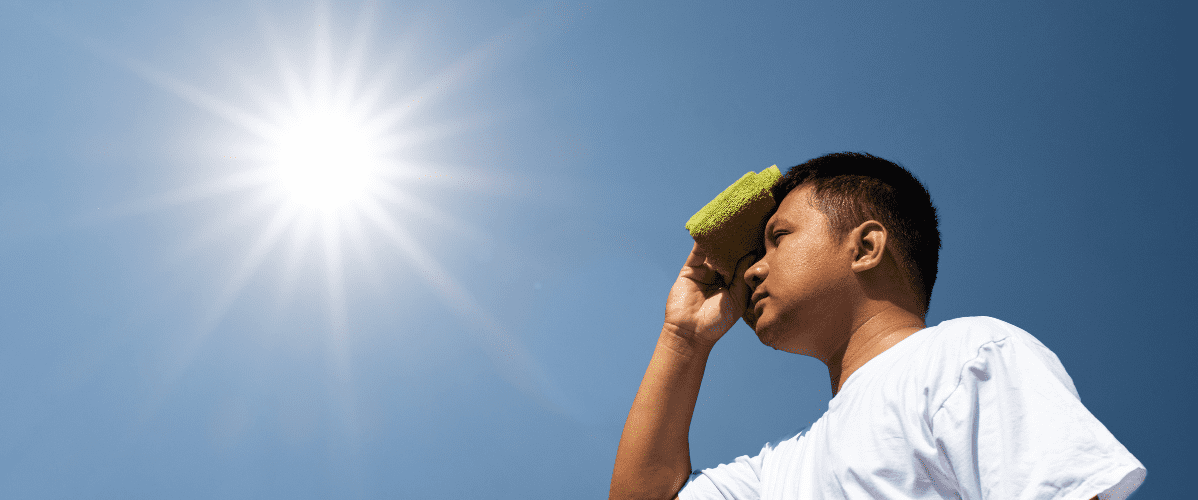
29 Mar How to Prevent Heat Stroke & Heat Exhaustion (Tips, Symptoms)
How to Prevent Heat Stroke & Heat Exhaustion (Tips, Symptoms)
By Island Hospital | Mar 29, 2024 3:00:00 PM
With the frequent hot and dry seasons in Malaysia, it is crucial to recognise the signs of and prevent heat-related illnesses like heat stroke and heat exhaustion.
These are serious conditions, capable of swiftly escalating into life-threatening situations if untreated. Children and the elderly are especially vulnerable to this hot weather.
In this article, we provide a complete guide to heat stroke and heat exhaustion, including prevention measures, symptoms to recognize, and treatments to employ in emergency cases.
Malaysia’s Hot Weather
Early this year, MetMalaysia forecasted dry and hot weather until March, with temperatures potentially soaring up to 35°C. Heat wave warnings were issued in certain areas across the country.
These forecasts coincided with the end of the north-east monsoon, where hot and dry weather and minimal rainfall are expected during this period.
The northern states of the peninsula, such as Kedah, Penang, and Perak, are especially affected during this time.
This phenomenon of hot weather occurs every year from February to May in Malaysia.
The sweltering heat can cause heat-related illnesses like heat stroke and heat exhaustion, which could result in temporary discomfort, health complications, or even death.
Given these risks, it’s important to remain vigilant during hot.
Heat Stroke Vs. Heat Exhaustion
Let’s look at the difference between heat stroke and heat exhaustion.
| Heat Stroke | Heat Exhaustion |
|---|---|
| Most severe heat-related illness. | Individuals at higher risk of this illness are: the elderly, those with high blood pressure, and those working in hot environments. |
| Heat stroke occurs when the body can no longer regulate its temperature. | Heat exhaustion is the body’s reaction to an excessive loss of water and salt through excessive sweating. |
| Can result in permanent disability or death if left untreated. |
Symptoms
An important step to keep ourselves and others safe during hot weather is learning the symptoms of heat-related illnesses. Look out for the following signs:
Heat Stroke
- High body temperature (40°C or higher)
- Flushed, dry skin that does not sweat
- Racing heart rate
- Headache
- Dizziness
- Nausea or vomiting
- Confusion
- Passing out
- Seizures
Heat Exhaustion
- Profuse sweating
- Cold, pale skin
- Muscle cramps
- Fatigue
- Feeling weak
- Dizziness
- Headache
- Upset stomach or vomiting
- Fainting
If you or someone you know shows any of these symptoms, especially heat stroke related, get medical help immediately.
Tips to Prevent Heat Stroke & Heat Exhaustion
Follow these insightful tips to keep yourself cool in hot and dry weather:
1.Wear lightweight clothing
- Wear airy, lightly-coloured and loose-fitting clothes to allow your body to cool properly.
2. Wear sunscreen
- Sunburn can lead to dehydration and affect your body’s ability to cool down. Protect yourself in the outdoors by applying sunscreen with SPF 15 or higher 30 minutes before leaving the house.
- Reapply your sunscreen every 2 hours, and remember to wear a wide-brimmed hat and sunglasses for extra protection against the sun.
3. Drink plenty of water
- Drink more water, regardless of physical activity and even if you don’t feel thirsty. However, avoid sugary, alcoholic, or cold drinks.
4. Avoid the sun during the hottest parts of the day
- Avoid doing outdoor activities between 11am and 3pm. Instead, choose the cooler hours of the day such as the morning or evening.
- While doing these activities, remember to take frequent breaks in shady areas and let your body recover.
5. Slowly adjust to the hot temperature
- Reduce physical activity in hot environments. For those not used to working or exercising in hot weather, begin with a slow pace and gradually increase intensity.
- However, if exertion in the heat causes rapid heartbeat and difficulty breathing, cease all activity and rest in a shaded area.
6. Be extra cautious when using certain medications
- Some medications can make you more prone to dehydration. Consult your doctor to find out more about your prescriptions and their effects on your body.
7. Never leave anyone in a parked car
- Cars can heat up to extreme temperatures, even when parked in the shade or with the windows cracked open. Children left in parked cars are especially at risk of heat stroke or death.
8. Stay alert if you are at increased risk
- Individuals who are at high risk are those who are: very young, very old, overweight, physically ill (e.g., diabetes, heart problems), or take certain medications.
- Be extra careful if you are in these categories, and check on friends, family, and neighbors who are at greater risk.
9. Keep your home cool
- For optimal home cooling, open windows during the cooler night and early morning hours, then close those facing the sun as temperatures rise throughout the day.
- Minimize heat sources by switching off artificial lights and electrical devices that generate heat, and use air conditioning when possible to maintain a comfortable indoor temperature.
Treatment / First Aid
Here’s how you can help someone facing heat stroke or heat exhaustion:
Heat Stroke
- Call 999 for emergency medical attention.
- Stay with them until help arrives.
- Move them to a cool area.
- Remove all excess clothing (e.g., jacket, shoes, socks).
- Cool them by:
- Placing them in a cool bath or shower.
- Placing cold wet cloths on their head, neck, armpits, and groin.
- Sponging them with cold water.
- Soaking their clothing with cool water.
- Circulate the air around them.
- Continue cooling them down until medical help arrives or until their body temperature drops to a safer level (under 40°C).
Note: Do not give them fluids (e.g., water, sports drink).
Heat Exhaustion
Bring them to an emergency room. If this is not possible:
- Call 999 for emergency medical attention.
- Stay with them until help arrives.
- Move them to a cool area.
- Get them to hydrate with cool water.
- Remove all excess clothing (e.g., jacket, shoes, socks).
- Cool them by:
- Giving them cold compresses.
- Having them wash their head, face, and neck with cold water.
- Letting them drink frequent sips of cool water.
Schedule an Appointment with Island Hospital
During the hot and dry season, remember to practice these proactive measures to keep you and your loved ones safe. Stay alert and watch out for any signs and symptoms of heat-related illnesses.
If you’re or someone you know is exhibiting symptoms, seek immediate medical help. Contact the Emergency Hotline at Island Hospital. Our team of medical professionals are ready to help you.
FAQ
How do you stop heat stroke before it starts?
Here are a few tips to prevent heat stroke:
- Wear lightweight clothing
- Wear sunscreen
- Drink plenty of water
- Avoid the sun during the hottest parts of the day
- Slowly adjust to the hot temperature
- Be extra cautious when using certain medications
- Never leave anyone in a parked car
- Stay alert if you are at increased risk
- Keep your home cool
Can drinking water prevent heat stroke?
Drinking water helps maintain hydration, reducing the risk of heat stroke, but it’s not a guaranteed prevention method. Remember to practice other measures too such as wearing lightweight clothing, wearing sunscreen, and reducing outdoor activities.
What is the fastest way to cure heat stroke?
Move to a cool place, remove excess clothing, and apply cool compresses, while waiting for medical help to arrive.
Can sunscreen prevent heat stroke?
Sunscreen indirectly prevents heat stroke. It protects against sunburn which dehydrates your body and affects your body’s ability to cool down. Remember to practice other measures too such as wearing lightweight clothing, drinking plenty of water, and reducing outdoor activities.
What are signs of heat stroke?
The signs of heat stroke are:
- High body temperature (40°C or higher)
- Flushed, dry skin that does not sweat
- Racing heart rate
- Throbbing headache
- Dizziness
- Nausea or vomiting
- Confusion
- Passing out
- Seizures
If you or someone you know shows any of these symptoms, get medical help immediately.











![[IH 2025] #33 ECG Test_Image 1 medical-machine-ecg-test](https://islandhospital.com/wp-content/uploads/2025/07/IH-2025-33-ECG-Test_Image-1-600x400.png)

